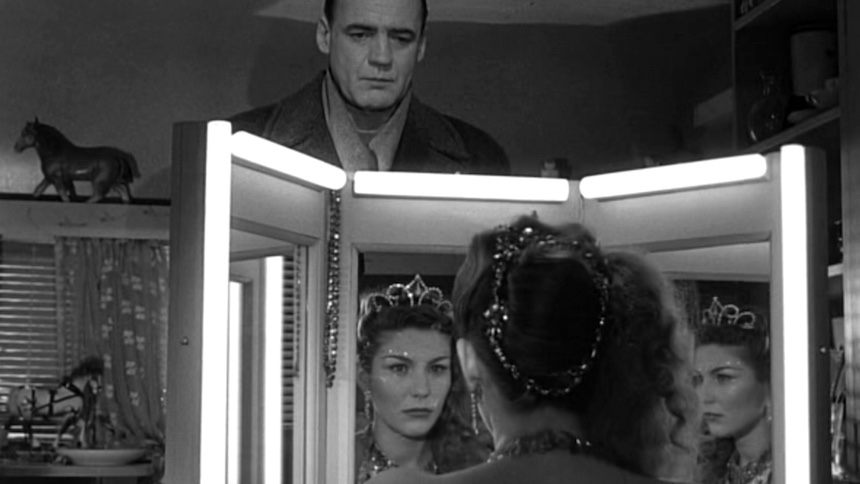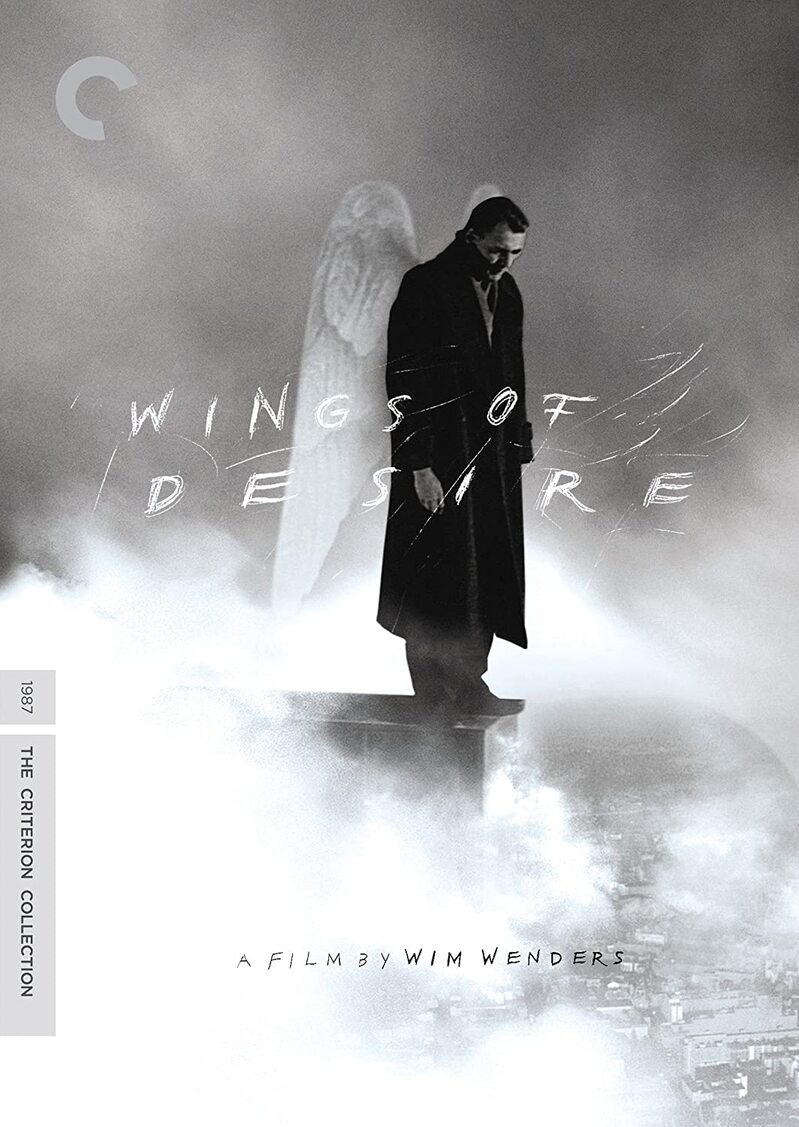WINGS OF DESIRE Blu-ray Review: Compañero
Wim Wenders directed; Bruno Ganz and Peter Falk star.

Despite Wings of Desire being my favourite film, I often find myself a bit peevish after watching it. It's hard to explain how a film so full of joy and life and optimism could leave me irritated, but perhaps because the experience is over, and for those two hours, I was too immersed in its warm and abundant embrace. And Wings of Desire is truly an experience.
Arguably Wim Wenders' greatest work, one that came together almost by accident and certainly by desperation, it remains the iconic film of (the former West) Berlin, and one that most often introduces newcomers to Wenders' work. Winner of the Best Director award at Cannes 1987, Criterion is releasing a new director-approved 4K disc, along with a Blu-ray and extras to enhance the experience.
The sky over Berlin, as the original title translates, tells the story of Damiel (Bruno Ganz), an angel who, like all of his kind, has walked the earth since there was an earth. In recent years, angels such as him and his friend Cassiel (Otto Sander) observe the humans around them - making notes of their days and experiences, and sometimes acting as, well, guardian angels, transfering thoughts of love and hope to those in their midst. But Damiel, it seems, has fallen in love with Marion (Solveig Dommartin), and he must decide whether to continue to love her from afar, or to embrace the mortal coil to be with her.
Set in the late 1980s, it is in one way a time capsule of this time and place. West Berlin evolved as quite a unique city: separate from West Germany for decades, with its only narrow corridors of transport access, and separate from East Berlin by a wall (or really two walls). And yet, somehow, this place became a mecca of subculture, at once both insular and yet resonating throughout Europe. A symbol of the west versus the east, with access to both democracy and communism, it formed a microcosm. No wonder Wenders wished to capture it, that unique spark, through the eyes of these angels.
We see the streets and shops, the beautiful library - a tribute to everything humans have gained since their collective birth, our knowledge - but we also see the decay, brought about not just by the twilight of humanity that could be felt even forty years ago, but the decade of this city, in this somewhat unnatural state. And what better opportunity to give us access to human thought?
As Damiel and Cassiel float throught the city, they find themselves hearing everyone's thoughts. Some are random thoughts of shopping or meals; but as Wenders and his fellow writers (as well as the actors) showcase, these are the thoughts that most of us have, often on a daily basis. Why are we here? Why am I here? What is the purpose of this existence, and am I able to let it go? Where is the love I need? Where are the friends I lost? Not that joy doesn’t come into our thoughts, but perhaps joy needs less analysis. Imagine the energy of all these thoughts in the air, and beings like Damiel and Cassiel always hearing. To be privy to these thoughts unfiltered gives the film the kind of poetry in words that most cinema lacks by virtue of its visual nature.
No wonder, for Damiel, the angel world no longer is sufficient. He has watched and listened for an eternity, but this black and white existence only has eternity to offer; to truly understand humans, you must live like them. Perhaps there is naïveté in this, but it’s hard not to agree with Peter Falk, a former angel himself, when he talks of the pleasure of drawing; it’s impossible not to smile at Damiel’s joy in his first cup of coffee. And even if I’ve seen this film a dozen times, I’m still terrified that Marion and Damiel will miss each other.
Watching the film with audio commentary was something I had avoided in the past, as I was worried it would take away from the film’s magic. But listening to Wenders talk about how and why he decided to do the film - partially out of financial necessity, but mainly as a tribute to his city, on the verge of change, and at a point when Wenders had been moved back after living in America for so long, he was worried about losing his language.
This film is so much about language - what it means, how we use, what it can express, and what it can’t - it made me grateful to be bilingual, grateful for the ways I can express myself without words. As Damiel does when he holds the stone, as Marion does on the trapeze (a skill learned by Dommartin for this film, all the work is done by her), and also how they can also find the poetry of language, as the best means of verbal expression.
Such is the joy of Wings of Desire, perhaps because it is examining the universal through the specific and the fantastical: we can only truly understand others when we hear what's going in in their minds; that unfiltered access to all our hopes and fears and sorrows, so common in all of us; that moment when we can be there for someone who is lonely, someone who is dying, someone who is wanting to be lost, someone who is finding their way home.
Special Features
Criterion have been updated many of their editions with fantastic 4K restorations, with the best audio available, and director approved if possible. In this case it is approved by Wenders, and for a film that is so much about what these angels see and hear, it looks as beautiful, stark, colourful, and alive as it did when it was first screened.
The Angels Among Us, a documentary made for the first Criterion release, is included. I had always avoided it, because for some reason I wanted to keep the mysteries of the film just that. But it's also amazing to hear how the film came together, and how Wenders weaved his tale through a lot of improvisation and necessity.
Of course, it's not improvisation; for any writer, director, actor, who has experience, even if they think they're pulling a film together on the fly, their experience already has laid the template for the work. All it needs is the idea. But it's fascinating to hear how he cast Ganz and Sander, in part because they were already good friends; how they had made a film (also included) about the actor who played the old man, and how that actor, and the renowned cinematographer Henri Alekan, came out of retirement to make this film.
For fans of looks behind the scenes and director's cuts - well, there is some of the former with footage from a 1987 television show, with footage of Wenders talking with Ganz on set. There are also deleted scenes and outtakes - perhaps nothing that would have changed the film, but moments especially of the city, with the Damiel walking before he fell to earth and after. It's a study in how Ganz changed his physical presence from one moment to the next as he realized how an angel would have to learn how to move as a human. There is also a gallery of photos and designs from art directors Heidi and Toni Lūdi.
There are two highlights in the special features. The first is a pair of documentaries about Alekan; it's no wonder Wenders asked him to work on the film, considering his long filmography and his ability to use every advantage to create the most perfect light. A documentary features him explaining his philosophy of film lighting -- while it's impossible to duplicate real natural light, you can inspire the effect -- and what he calls the complexity of simplicity. He explains a special lighting technique that he invented. While he might have made his career in the days of print film, it's still well worth your time, and that of any aspiring cinematographer, to hear his words of wisdom.
The booklet contains the poem Song of Childhood by co-screenwriter Peter Handke, which is quite nice to read on its own (though it's impossible not to hear Ganz's voice when reading). Michael Atkinson's essay 'Watch the Skies' discusses the film as something of an anomaly in Wenders' filmography (not sure if I agree with that), as well as analyzing the angels, and discussing how the film still haunts us as a singular work, even after more than 30 years.
The second highlight, at least for me, came with An Attempted Description of an Indescribable Film, Wenders' notes from the first treatment of the film. And since the script itself was written somewhat as it was being shot, I imagine this treatment was a constant touchstone for everyone involved, so it's quite a treasure to have Wenders' poetic musings.
Wings of Desire is currently available from The Criterion Collection.
Wings of Desire
Director(s)
- Wim Wenders
Writer(s)
- Wim Wenders
- Peter Handke
- Richard Reitinger
Cast
- Bruno Ganz
- Solveig Dommartin
- Otto Sander








